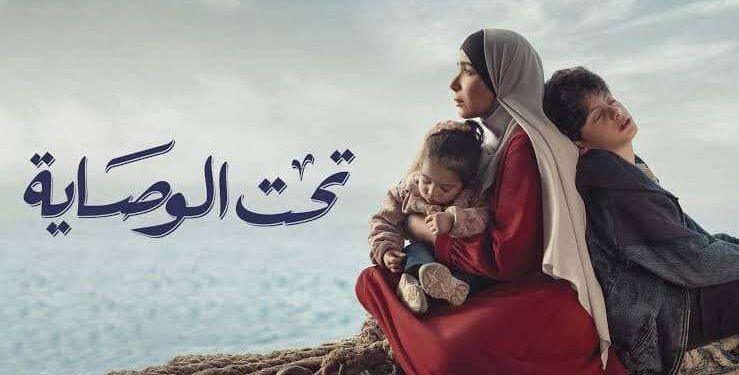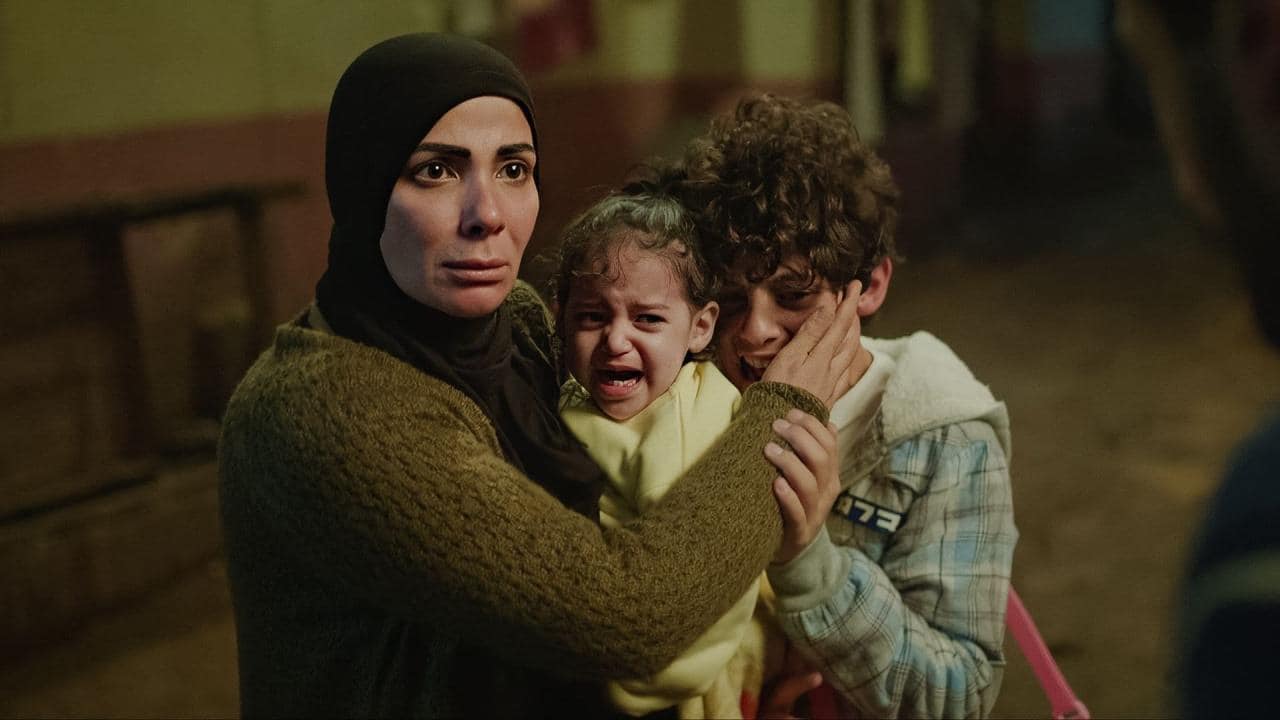Hanen was sentenced to one year in prison. What was she accused of?
To have wanted to preserve the heritage of his minor children, which their greedy uncle uncle wanted to appropriate, and to want his children to have a bright future, while the paternal grandfather, their tutor, wanted them to learn a job instead of going to school. She had thus contravened the Egyptian law which wants that on the death of the father, it is up to the men of the paternal family to make the decisions concerning minor children.
Hanen, interpreted by Mona Zaki, is the main character of the Egyptian soap opera Taht el Wissaya (under the supervision), Written by Khaled and Shyrine Diab, directed by Mohamed Shaker Khodair and broadcast during the second half of the month of Ramadan.
Hanen is a young widow who has to face the legal supervision of the paternal grandfather of his two minor children, who inherited a fishing boat from their deceased father. According to Egyptian law inspired by shariaa, the supervision of minor children goes to the paternal grandfather in the event of the father’s death, which gives him the right to make all the decisions concerning children, even if the mother does not agree. The soap opera deals with this sensitive subject and denounces the injustice of this system through the history of Hanen, which must not only undergo the legal guardianship of the paternal grandfather, but also the moral guardianship of a patriarchal and macho society. The soap opera shows how such a system can not only break families, but also endanger the future of children.
In Tunisia, some people are shocked by Taht el Wissayawhich stages the sufferings and struggles of Egyptian widows with minor children. The law, inspired by Shariaa, gives the supervision of paternal grandfathers and even paternal uncles to manage the inheritance of these minor children and make important decisions for them, as registering or not in school, allow them to work or not to join a sports club. The grandfather decides. Sometimes, in addition to the grandfather’s agreement, it is also necessary to agree with the state, for example to sell a property belonging to these minor children. As for the mother, she is completely nonexistent in the eyes of the law. It only served to wear these children and must now be content to “serve” them, that is to say to prepare them to eat, to treat them when they are sick, to help them take a bath, like a simple nurse or governess. She does not even have the right to decide whether or not she should cut the hair of her own children.
It should be noted that what this soap is shown is not specific to Egypt. This is how in all countries that apply shariaa, and who knows, perhaps one day with us?
Imagine what these women feel, these mothers, from whom we tear all the rights over their children and who are at the mercy of a grandfather or an uncle who, of course, can be benevolent, but who can also be ignorant, cupid or other.
Not so long ago, Tunisian mothers were also faced with a humiliating and degrading situation: obtaining the father’s authorization to take their minor children abroad. I myself experienced this situation and I can understand what all these women feel in the Arab-Muslim world.
At the time my husband had left for France for his work and offered to join him with our minor daughter during the holidays.
I had prepared everything for the trip, but I had completely forgotten this requirement for paternal authorization to leave the territory. My daughter and I had therefore arrived at the airport and during the border police, I had been asked for this authorization. I had explained that the dad was already in France and that we were going to join him, but that had been categorical. As a mother, I was not allowed to take my daughter out of the Tunisian borders.
I was refused to call my husband to obtain his authorization by phone, since nothing proved that it was well on the phone. The one and only option was to call on the grandfather or a paternal uncle to obtain this authorization. My daughter and I was therefore taken to an office to wait for the arrival of the paternal uncle I had contacted. Once there, he had to answer many questions to prove his identity and guarantee that my daughter was not likely to be in danger with me. I found myself helpless, without being able to open my mouth to express myself, because an agent was silent with each attempt.
The border police trusted the uncle because he is a man and allowed me to travel with my daughter, but this same border police did not trust me, the mother, because a woman. Me the mother who had brought her in me, me the mother who had breastfed her, me the mother who had watched her, me the mother who took her to the pediatrician, me the mother who watched over what she had all her vaccines, me the mother who had treated her, me the mother who took her to school, who made her do her homework, who was eating her, who was getting her clothes. But I was only the mother and for the border police, I was this woman who could have fled with this little minor girl. Knowing that in the opposite situation, his father could have taken him at any time, including to run away with her without anyone asking her accounts. He was the father, the man !!!
But all this had no value in the eyes of these agents, nor of the one who had “laid” this unjust and discriminatory rule. As a mother, I was powerless in the face of an authority that gave more power to a man than a woman, simply because of her gender. It was humiliating, degrading and unfair.
This injustice is a reality that many women in the Arab-Muslim world live on a daily basis. The law, inspired by Shariaa, continues to give power to men on the lives of their minor children, relegating mothers to the background, speechless or choice.
Imagine the pain of these women, these mothers, who see their maternal rights flouted, who are dismissed from decision -making concerning their own children. Imagine the frustration of seeing men decide the fate of their children, without even taking into account the needs and wishes of mothers. Imagine how horrible it is, especially when this man is not even the father of these children !!!
And this is not limited to legal supervision. Women are often faced with discrimination and inequalities in other aspects of their lives, such as work, education and freedom of movement. They are often limited in their choices and opportunities due to social standards and gender -based discriminatory laws.
But despite all this, women continue to fight, to fight for their rights and for equality. They come up after each obstacle, defying the standards and expectations of society, and showing their determination to be treated as equal human beings in rights and dignity.
I remember the joy and relief that I felt when in Tunisia this unjust rule had been repealed and that I was finally able to travel with my daughter without any authorization, when I was able to exercise my maternal rights without being hampered by discriminatory laws. It was a small victory, but it strengthened my determination to continue to fight for women’s rights, for a future where women will be respected, valued and equal to men in all aspects of life.
I am grateful to those who have contributed and continue to contribute to the struggle for the emancipation of women in Tunisia. Their efforts have paved the way for a positive change, but there is still a lot to do. We must continue to fight for a world where women will have the same rights as men, where mothers will have a strong voice in the lives of their children, and where women will be respected and valued for their essential role in society.
In Tunisia, in Egypt and all over the world, it is time to end these gender -based discriminatory laws, inspired by Shariaa or other oppressive social standards, which deprive women of their maternal rights and relegate them to lower status. It is time to recognize the value and importance of women as mothers and as equal human beings. It is time to create a future where women will have the freedom to make decisions for their children and for themselves, without being hampered by absurd, unjust and discriminatory laws.
Congratulations to the scriptwriters Khaled and Shyrine Diab for their role of awareness of this question through their soap opera, which could contribute to changing laws in Egypt. It is encouraging to note that a deputy has already asked to grasp the Parliament on this subject, thus testifying to the positive evolution of Egyptian society. It is essential that such archaic laws are changed, allowing mothers to obtain the supervision of their minor children, because they are the ones who know them best and know what is best for them. In particular, at a time when women, more and more educated, leave the kitchens where they were relegated to take part in working life.
It should be recalled that in Egypt, films have already had an impact on the change of laws. The best known case is that of the film Ouridou Hallan (I want a solution) (1975), with Faten Hamama in the main role. This film tells the difficulties encountered by the Egyptians who wish to divorce despite the opposition of their spouse and who could spend very long years before the courts without succeeding in obtaining satisfaction. Thanks to this film, the law on “Khol3” which allows women to obtain divorce, has been voted.
Neïla Driss









